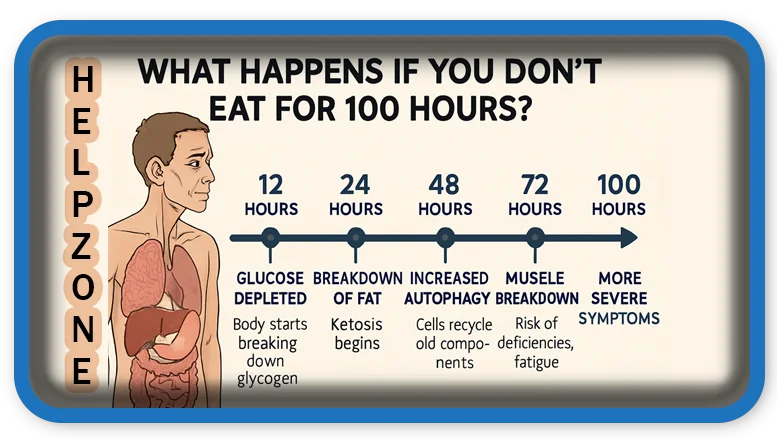⏲️ Estimated reading time: 5 min
What Happens to Your Body If You Don’t Eat Anything for 100 Hours?
Fasting for 100 hours pushes the body into survival mode. Discover the physical and mental effects of prolonged fasting, how your body adapts, and the risks involved in this extreme scenario.
Fasting has become a popular topic, especially with trends like intermittent fasting and extended water fasts gaining traction. But what really happens when you don’t eat anything for 100 hours just over four days? This isn’t just skipping meals; it’s a significant metabolic challenge for your body. While the idea may sound extreme, some people undertake fasts of this length for spiritual, medical, or weight-loss reasons. Here’s a deep dive into what happens to your body during this period.
Hour 0 – 12: Glycogen Depletion Begins
At the very beginning, your body relies on glucose the sugar from your last meals. Your liver stores glucose in the form of glycogen, which fuels your cells. During the first 12 hours of not eating, your body uses up glycogen to keep blood sugar levels stable and power basic functions.
You’ll likely feel normal at this stage. Maybe a little hungry or irritable, but you’re still running on reserves.
Hour 12 – 24: Entering the Fasted State
After 12 hours, insulin levels start to fall, and your body signals that it’s time to switch to burning fat for energy. Glycogen reserves are running low, and fat breakdown begins. You may experience:
- Hunger pangs
- Slight dizziness
- Mental fog
- Decreased physical energy
Ketone production begins at this point, albeit at a low level. Ketones are compounds produced when fat is broken down for energy, and they start to replace glucose as a fuel source.
Hour 24 – 48: Ketosis Increases, Hunger May Fade
As your body continues to burn fat, ketone production ramps up. This process is known as ketosis. Ketones are more efficient than glucose in some ways, especially for the brain. You may feel:
- Sharper focus
- Less hunger
- An odd metallic taste in your mouth
- Mild fatigue or mood swings
This is when some fasters report a “fasting high” or mental clarity. However, it’s also the time your body starts conserving energy, so you may feel a noticeable dip in physical performance.

Hour 48 – 72: Autophagy and Muscle Breakdown
Around day three, autophagy kicks in. This is a powerful self-cleaning process where the body breaks down damaged cells and recycles their parts. It’s associated with longevity and disease resistance. However, this benefit comes with a cost.
Your body also starts to break down muscle tissue to extract amino acids for vital functions. If you’re not supplementing with electrolytes, you might experience:
- Headaches
- Muscle cramps
- Heart palpitations
- Severe fatigue
The loss of lean mass starts becoming a concern, especially for those with low body fat to begin with.
Hour 72 – 100: Deep Fasting and Increased Risk
By the fourth day, your body is fully adapted to burning fat and ketones. Insulin levels are low, and growth hormone levels may rise to protect muscle mass. But the longer the fast continues, the more the body shifts into survival mode.
Potential symptoms now include:
- Lowered blood pressure
- Weakened immune response
- Risk of electrolyte imbalance
- Mood disturbances
- Insomnia or vivid dreams
There is also a psychological element: while some may feel euphoric or mentally clear, others can experience anxiety or depression due to the stress placed on the system.
Refeeding: A Critical Step
Breaking a 100-hour fast isn’t as simple as eating a burger and fries. Refeeding syndrome is a dangerous shift in fluids and electrolytes that can occur when food is reintroduced too quickly. Symptoms can be life-threatening, including:
- Irregular heartbeat
- Seizures
- Organ failure
To avoid this, refeeding should be slow and planned starting with small portions of easily digestible food like broth, steamed vegetables, or fermented foods.
Always consult a medical professional before attempting extended fasts.
Risks and Warnings
Fasting for 100 hours is not for everyone. You should never attempt it if you:
- Are pregnant or breastfeeding
- Have a history of eating disorders
- Are underweight
- Have diabetes or blood sugar issues
- Are taking medications that affect insulin or blood pressure
Benefits of a 100-Hour Fast (When Done Safely)
If managed correctly and done under supervision, extended fasting may offer benefits like:
- Mental clarity
- Anti-inflammatory effects
- Weight loss
- Improved insulin sensitivity
- Enhanced autophagy
Still, these benefits can often be achieved with safer, shorter fasts combined with healthy nutrition.
Conclusion
Not eating for 100 hours sends your body through a fascinating and at times dangerous metabolic journey. While it may offer some health benefits, it’s not something to be taken lightly. The body is resilient, but extended fasting must be approached with caution and respect. Think of it not as a quick fix, but as a tool to be used sparingly and wisely.
🏷️ Tags: fasting, extended fasting, ketosis, 100 hour fast, health risks, autophagy, refeeding syndrome, metabolic health, weight loss, survival mode
Only logged-in users can submit reports.
Discover more from HelpZone
Subscribe to get the latest posts sent to your email.

